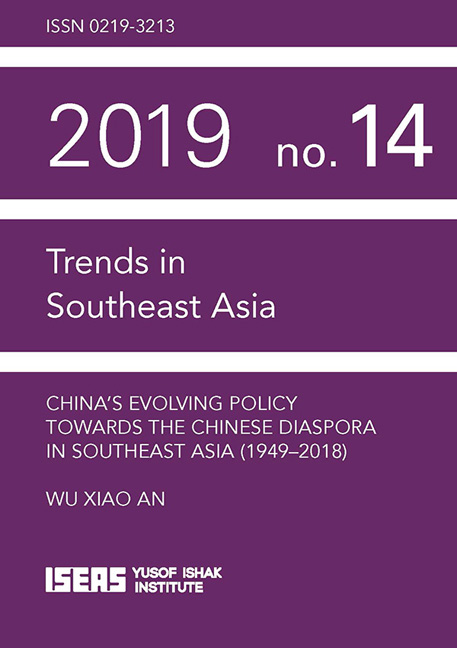China's Evolving Policy towards the Chinese Diaspora in Southeast Asia (1949–2018)
Published online by Cambridge University Press: 31 January 2020
Summary
INTRODUCTION
The issue of China and its diaspora, particularly the one in Southeast Asia, is the subject of much academic attention and popular controversy. China's diaspora affairs receives greater scrutiny than the diaspora issues of other countries such as India, Israel, and Ireland. This paper tries to tackle the issue holistically by covering both the historical and contemporary dimensions of Chinese diaspora policy, with an emphasis on its reach and impact in Southeast Asia.
There is a need to clarify at the outset the various terms related to China's diaspora discourse. The two primary terms are “overseas Chinese” and “Chinese overseas”. According to Professor Wang Gungwu, these two terms posit a legal and political distinction between two different ethnic Chinese communities residing outside mainland China. The “overseas Chinese”, or huaqiao (华侨) in Mandarin, refer to citizens of China who are living abroad. The “Chinese overseas”, or huaren (华人), are foreign citizens who are Chinese by descent and ethnicity. This distinction between the huaqiao and huaren was introduced partly because the ethnic Chinese of Southeast Asia, having naturalized their citizenship in their country of residence, wanted to maintain and emphasize their difference and distance from the Chinese mainland. For them, this was a strategy of self-preservation, undertaken as a means of allaying domestic suspicions about their allegiance, especially in the light of anti-Chinese undercurrents running through many Southeast Asian countries.
However, it must be noted that the scholarly demarcation of these terms does not necessarily comport with their regular use and meaning on the Mainland. For instance, the terms “overseas Chinese” and “Chinese overseas” are often used simultaneously in China as a combined term huaqiao-huaren (华侨华人), which is denoted in English as a parallel term separated by a hyphen.
In the light of China's historical, ideological, and policy contexts, “overseas Chinese” is an evolving category which includes important contemporary dimensions such as the newer waves of Chinese migrants to the developed countries of the West as well as the overseas Chinese returnees of the 1950s and the post-1990s. It is important to note that China's diaspora policy, especially over the last few decades, has not only been directed at the Chinese residing abroad, but also to Chinese returnees who are either citizens or permanent residents of foreign countries, but who have chosen to return to settle in China.
- Type
- Chapter
- Information
- Publisher: ISEAS–Yusof Ishak InstitutePrint publication year: 2019



